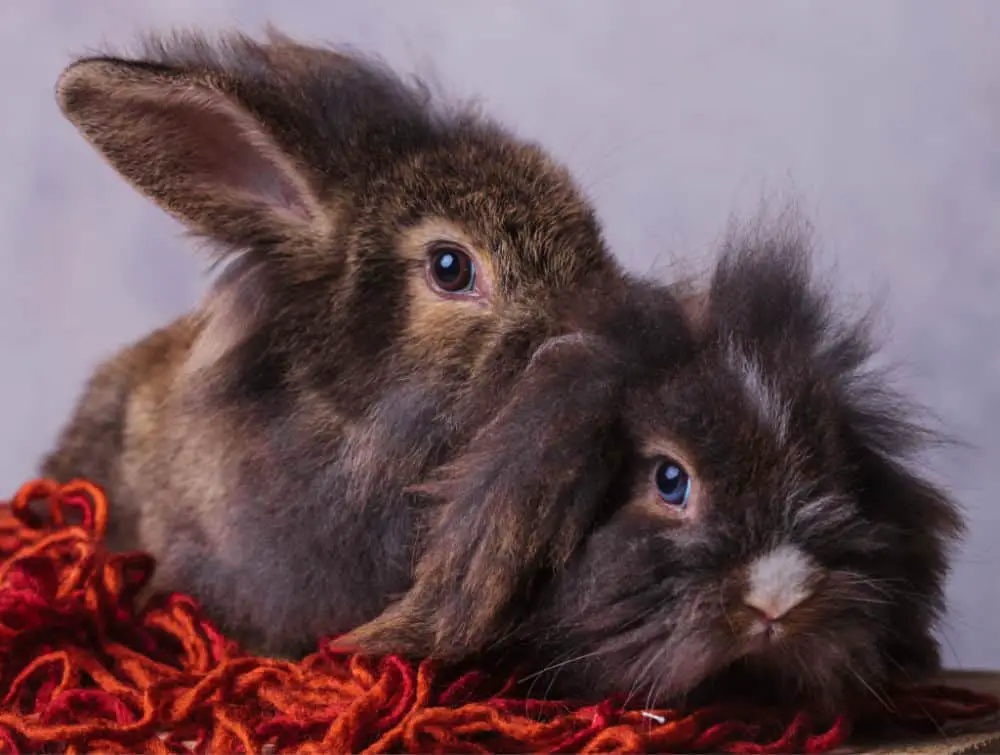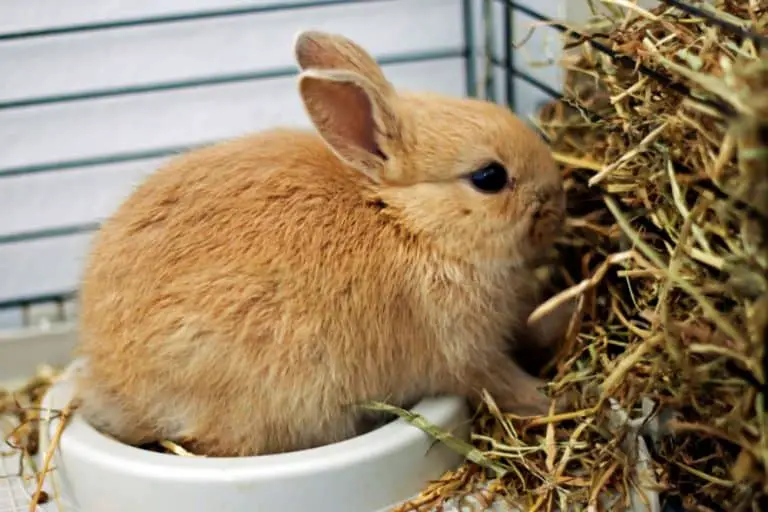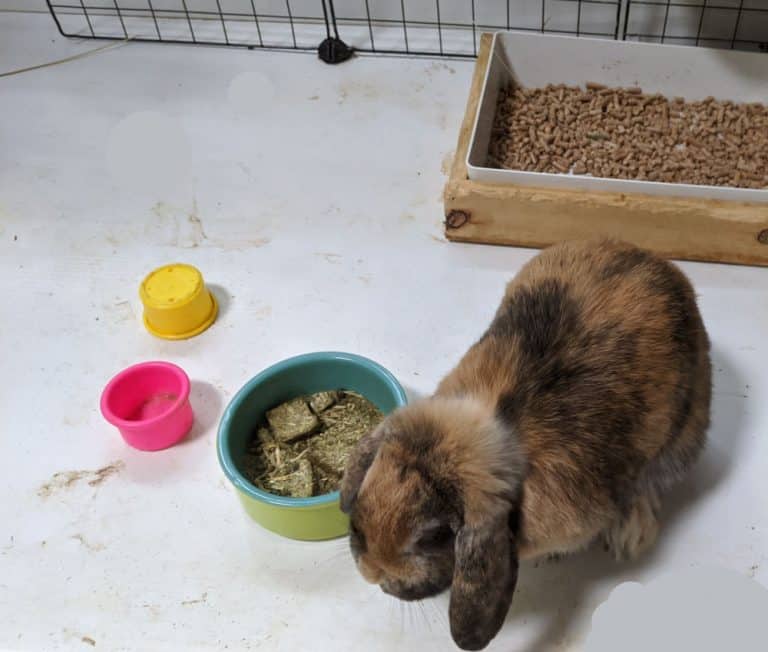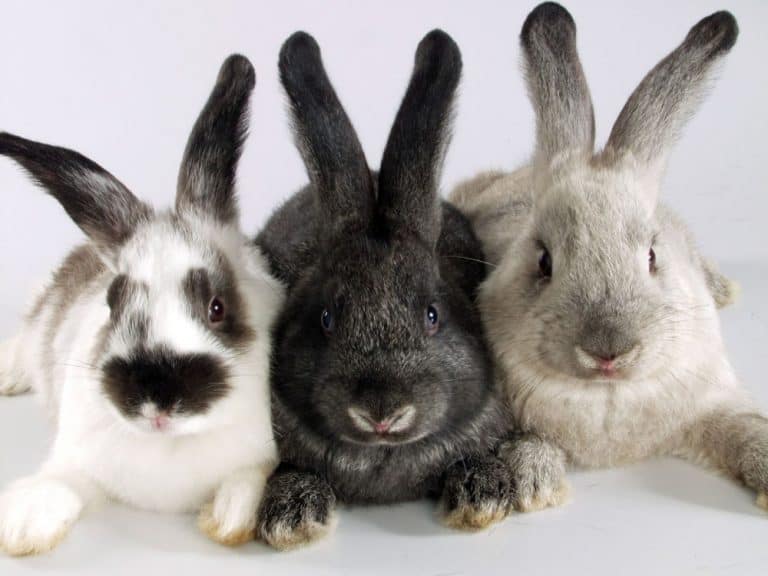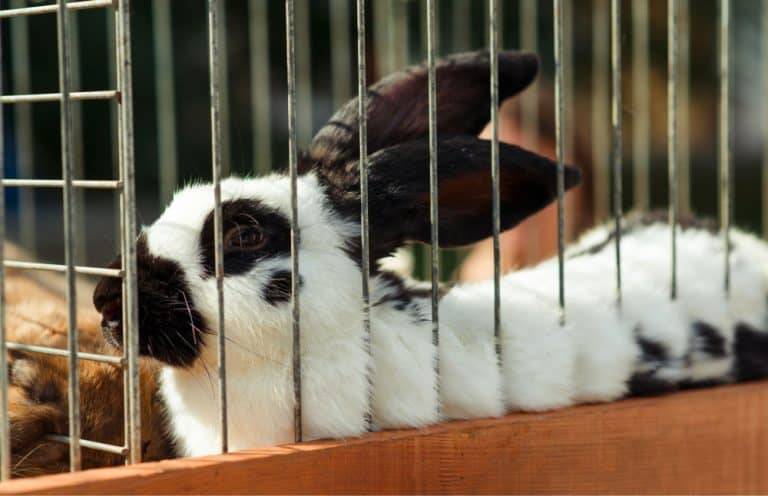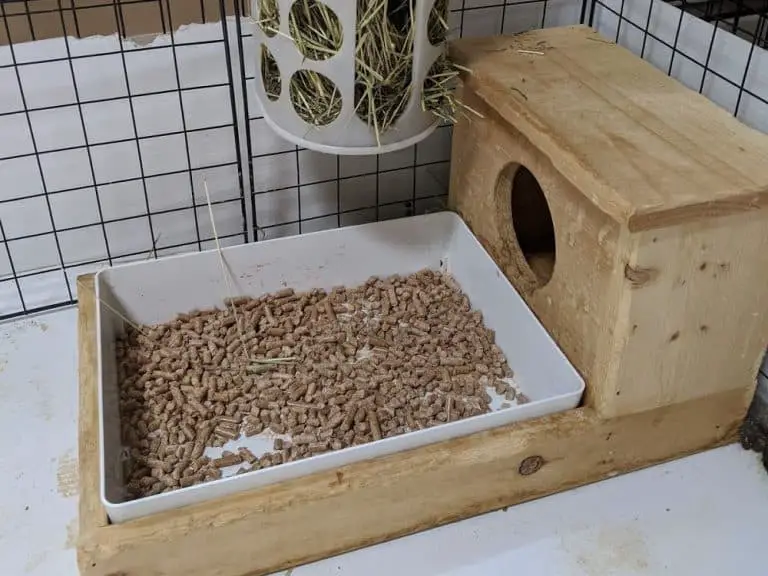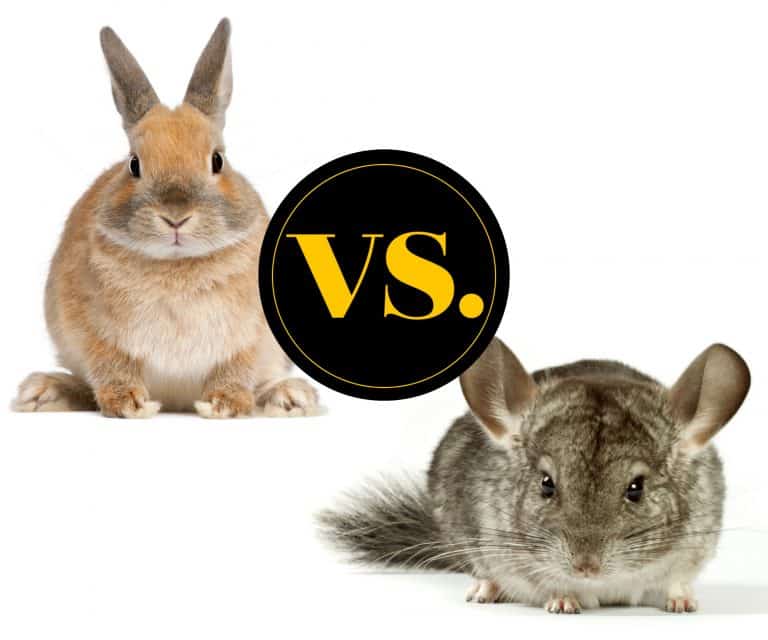Lionhead Rabbit Care Sheet: Diet, Habitat, and More
Lionhead rabbits are a relatively new breed of domesticated rabbits to the United States. With their characteristic wooly manes and their desire for lots of human interaction, Lionhead rabbits need more care than other domestic breeds of rabbits.
Adopting and caring for a Lionhead rabbit is a serious business. Lionheads require fresh food and water and a dozen other things to keep them happy and healthy. For example, they require suitable housing, proper training, and regular maintenance. Likewise, human contact is imperative.
This Lionhead rabbit care sheet will discuss some essential information to get you started with the newest member of your family. However, it is virtually impossible to cover all aspects of Lionhead rabbit care. So be sure to check out our list of additional sources at the bottom of this article.
Lionhead Rabbit Basics
As their name implies, Lionhead rabbits have a wooly mane circling their head. A relatively new breed, the British Rabbit Council recognized the breed in 2002, and the American Rabbit Breeders Association officially approved the breed in 2014.
Full-grown Lionhead rabbits weigh between 3 pounds (1.36 kg) and 3.75 pounds (1.7 kg). They have broad heads with well-developed muzzles and compact, well-rounded bodies with full chests and shoulders. Their hindquarters are broad and deep, and their bodies are firm to the touch.
Lionhead rabbit’s manes are medium-soft fur extended like a lion and full of life. Their manes form a full circle of hair around their face extending between 2 to 3 inches (5 to 7 cm). Additionally, their mane continues to create a “V” at the base of their necks.
They have short ears, not exceeding 3.5 inches (8.89 cm), and bold and bright eyes.
Lionhead rabbits enjoy an average lifespan of about seven to nine years. However, as with other rabbits, their age depends on a variety of factors to include diet and care.
Like other rabbits, Lionheads are crepuscular, which means that they are mostly active at sunrise and sunset. Rabbits typically sleep a lot during the day, leading many people to think that they are nocturnal. But that isn’t true. Check them out at dusk and dawn, and you will usually find that they are ready to play.
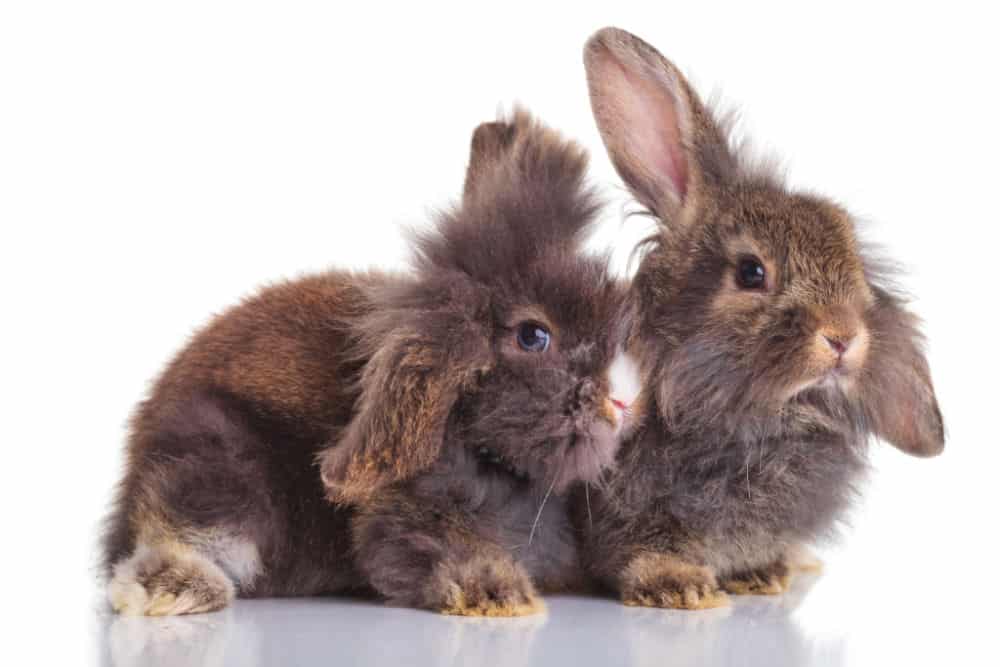
Selecting a Lionhead Rabbit
Be patient when choosing the perfect Lionhead rabbit for your home. Additionally, make sure you have carefully considered whether you are up to providing lifelong care for a rabbit.
You can purchase a Lionhead rabbit from an animal shelter, breeder, or pet shop. However, it is best to avoid buying animals from a pet store as they typically are shipped over long distances, come from mass-breeding sites, and are predisposed to illness and disease.
When choosing a specific rabbit, observe its behavior making sure it looks alert, curious, and has a shiny coat of fur. Additionally, make sure it has bright, sparkling eyes free from any discharge. Likewise, make sure it isn’t coughing, sneezing, and doesn’t have a runny nose.
You should also look at its litter box to make sure it contains dry stool and is devoid of any diarrhea or runny discharge.
Purchasing a Lionhead Rabbit From an Animal Shelter
Next to dogs and cats, rabbits are the most common species surrendered to local animal shelters. As the Humane Society explains, they are typically left at shelters due to problems associated with owners and not because of health-related issues or behavior. For example, some owners find they aren’t up to taking care of a rabbit or have to move.
When selecting an animal shelter or rescue organization, make sure to check out their reputation and applicable licensing and registration.
Ask for a tour of their facilities when they arrive, making sure everything is clean and well-organized. If not, you should find another place to adopt.
It is best to remain cautious when purchasing a Lionhead rabbit from an animal shelter or pet store.
Purchasing a Lionhead Rabbit From a Breeder
It is probably best that you purchase your Lionhead rabbit from a local breeder to make sure you get a healthy, well-bred rabbit. You can ask your veterinarian, a local pet supply store, or the ASPCA for a recommendation.
Once you have a recommendation, visit the breeder’s website (reputable breeders will have one) and look for information regarding their experience, history, and any applicable licenses or registrations (like with the American Rabbit Breeders Association).
Additionally, you should contact a breeder and ask any questions you may have about their experience, licensing, and the current availability of Lionhead rabbits.
Go ahead and schedule an appointment once you are satisfied with their answers. Ask for a tour of their facilities when you arrive, taking particular note of where the breeding stock is kept as well as babies.
If things are unkempt or disorganized, you should consider finding another breeder.
Preparing to Bring Your New Lionhead Rabbit Home
Your new Lionhead rabbit’s health and happiness are in your hands once you pick them up from a breeder or shelter. You will need to do a few things to prepare your home for its arrival.
First of all, you need to decide whether you want to keep your new rabbit indoors or outside. If you choose to keep your Lionhead rabbit indoors, you will need to rabbit-proof your home.
For example, rabbits love to chew, and you will need to put cable protectors over any electrical wires and other cables in the home. For instance, you will need to protect all electric cords, computer cables, phone lines, and the like.
Next, make sure you set up your rabbit’s hutch or cage before bringing your new pet home. Likewise, make sure you have a filled litter box, food dispenser, and water supply.
Lastly, make sure you have a good supply of toys on hand. Rabbits are playful and love gnawing on things. If you don’t have an adequate amount of toys to keep your rabbit amused, it will find their own in the form of furniture, shoes, rugs, and whatever else they find.
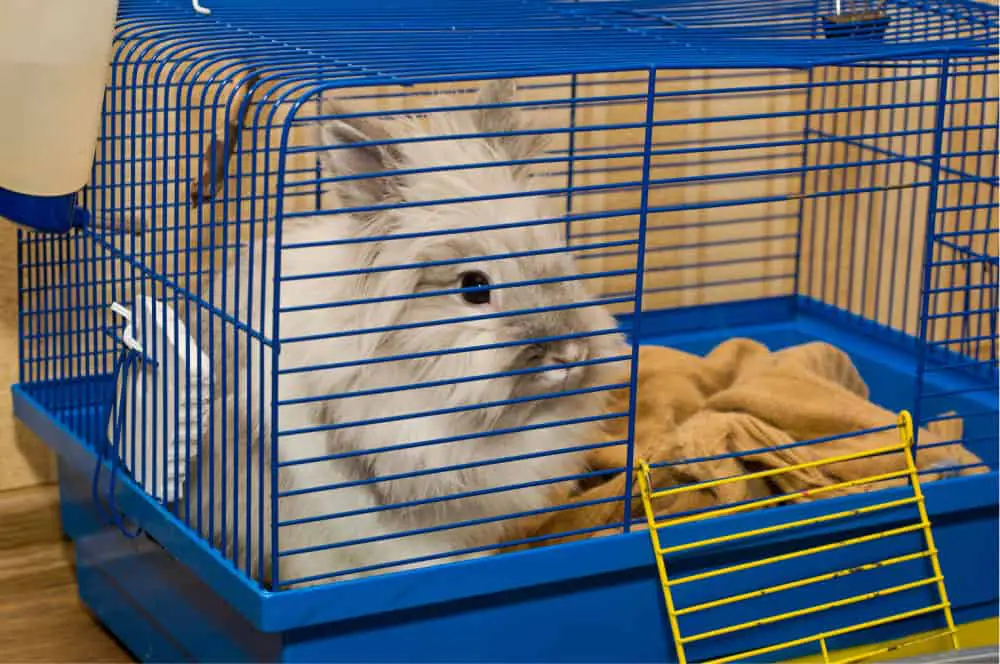
Housing Your Lionhead Rabbit
You will need to purchase a cage or hutch for your rabbit, whether you opt to keep it inside or outdoors. You will need to buy an enclosure large enough to allow free movement by your rabbit. Having a large cage is particularly crucial if you plan on keeping your Lionhead rabbit caged for a majority of the time.
Ideally, the enclosure should measure at least six to eight square feet (0.56 to 0.74 square meters) and about 2 feet (0.6 m) of height clearance. Ideally, rabbit enclosures should have a solid base and not wire as it can irritate their feet long term. However, if you already have a cage with a wire bottom, you can cover the base with hay, a rug or carpet, or other suitable bedding.
Additionally, your rabbit’s enclosure should have a closed-off section at one end (or in a corner) as a place of rest or refuge.
MidWest Homes for Pets offers an excellent Wabbitat Deluxe Rabbit Home Kit ideal for keeping your rabbit indoors. The kit includes an elevated feeding area, feeding bowl, external hay feeder, and water bottle. Additionally, you can purchase a rabbit hutch extension to provide roomy enclosed space for your rabbit to enjoy away from human eyes.
If you plan on keeping your Lionhead rabbit indoors, make sure you let it out of its cage daily for exercise. However, if you are concerned about allowing your Lionhead rabbit loose in your home, Amakunft makes a pop-open indoor and outdoor exercise cage tent designed to work with rabbits.
If you prefer housing your rabbit outside, Esright’s 54.3-inch (1.38m) Outdoor Rabbit Hutch can’t be beaten. This outdoor hutch includes elevated nesting and resting boxes with an easy-access ramp. Additionally, it has a large fully-enclosed outdoor activity space ideal for providing plenty of sunlight for your rabbit.
It also includes three access doors, and its waterproof angled roof is hinged for easy access.
Feeding Your Lionhead Rabbit
Lionhead rabbits are enthusiastic eaters. Typically, you should feed them a diet consisting of fortified rabbit pellets and unlimited Timothy hay, orchard grass hay, or alfalfa hay.
Additionally, they love all sorts of fresh fruits, vegetables, and seeds. However, some vegetables and other foods you should avoid feeding rabbits.
The following chart lists the foods you can give your rabbits and their daily needs as a percentage. Additionally, it contains foods to avoid.
| Daily Requirements | Types of Foods |
|---|---|
| Hay: 70 to 80 percent of their diet | Favorite hays to feed your rabbit include Timothy hay, orchard grass hay, and alfalfa hay (particularly for younger rabbits). |
| Veggies and herbs: 15 percent | Lionhead rabbits love basil, bell peppers, broccoli, Brussel sprouts, cabbage, carrots, celery, cucumber leaves, kale, mint, radishes, and turnips. |
| Rabbit pellets: 10 percent | Pellet food provides a lot of needed minerals, vitamins, and trace elements. However, rabbits tend to overeat pellets. For that reason, you should limit availability to about 1/8 cup for every pound of body weight. |
| Fruits: less than 5 percent | Most fruits are okay for your rabbits to include apples, apricots, cherries, peaches, and pears. |
| Food items to avoid: 0 percent | Never feed your Lionhead rabbits alcohol, bread, cauliflower, cheese, chocolate, coffee, cookies, crackers, pasta, peanuts, yogurt |
| Water | A fresh supply of water needs to be available 24 hours a day, 7 days a week. |
Litter Box Training Your Lionhead Rabbit
Training your Lionhead rabbit to use a litterbox can be challenging. First, place the litter box in an area where you can confine your rabbit for a few days. For example, you can set it inside your rabbit’s hutch, in a corner in a bathroom, or your laundry room.
Next, you will need to keep your rabbit in its hutch or whatever room you selected for its litter box. Be sure you provide food, water, a comfortable place to sleep, and plenty of toys as this room will be your rabbit’s home for a few days.
It helps to place some hay in the corner of a litter box filled with proper rabbit litter. Rabbits enjoy eating clean hay while pooping on the edge of the litter box.
Fresh News makes recycled paper litter that is ideal for rabbits. It eliminates odors quickly on contact using baking soda. And it is biodegradable and can be composted. Best of all, it is much more absorbent than litters made of clay and wood.
It typically takes several days for your rabbit to use its litter box consistently. As it does, you can gradually increase its freedom to move about your house or yard.
Some stubborn rabbits select a second location to use as a toilet. If this occurs, you may need to buy a second litter box to accommodate your furry friend. Check out this post for more litter training tips for your rabbit.
The good news is that as long as you change your rabbit’s litter box regularly, you shouldn’t experience any problems once your rabbit is potty-trained.
Ware Manufacturing makes a Scatterless Lock-N-Litter Pan that is ideal for Lionhead rabbits. Designed for corner use, they include hardware for attachment to rabbit cages to eliminate overturned litter boxes and scattered litter. Additionally, they have a plastic guard and wire floor to keep your Lionhead’s feet clean.
Regular Lionhead Rabbit Maintenance
Caring for your Lionhead rabbit’s health is essential. Fortunately, it isn’t difficult once you learn how. One of your most important tasks will be making sure it has fresh water available at all times since they dehydrate quickly.
There are other health concerns you will need to address frequently, like brushing their hair and checking their teeth. Other tasks like ensuring they receive any required vaccine booster typically happen on an annual basis. Additionally, you will need to keep on the lookout for any symptoms of illness and address those issues with your veterinarian as they arise.
Brushing Your Lionhead’s Fur
Lionhead rabbits can suffer from bowel obstructions and constipation if they swallow excessive amounts of fur while grooming themselves. For that reason, you should take a few minutes to brush your rabbit at least two or three times a week. Additionally, Lionhead rabbits shed more during the spring and autumn and should brush them daily during those seasons.
Likewise, your Lionhead’s mane requires regular combing as well as brushing. You should perform this task after brushing your rabbit to prevent knots and tangles. However, make sure you are gentle when working around its face, particularly its eyes.
The good news is that Lionheads love attention, and your daily brushing ceremony provides an excellent opportunity for bonding with your pet.
Lionhead Rabbit Dental Care
Lionhead rabbit owners need to check their teeth weekly since they never stop growing and can become misaligned. This problem occurs when your rabbit doesn’t eat enough fresh vegetables, hay, or food pellets. Eating a proper diet ensures that their teeth regularly wear down.
Contact your veterinarian as soon as possible if any of your rabbit’s teeth appear to be overgrown, particularly any molars. Oversized teeth can cause problems with your rabbit’s ability to eat. Additionally, they can lead to even more significant dental issues requiring surgery.
Vaccinating Your Lionhead Rabbit
Keeping your Lionhead rabbit vaccinated is an essential aspect of caring for your pet. The American Rabbit Breeders Association and veterinary medicine experts recommend vaccinating your rabbits against Myxomatosis and Viral Haemorrhagic Disease.
The cost associated with these vaccines is nominal, and the chance of your rabbit surviving either disease is not very good.
Myxomatosis and Lionhead Rabbits
Myxomatosis is a serious disease your Lionhead can catch. Its symptoms include discharge from the nose, runny reddish eyes, and swelling in the genital area and around the head.
Commonly spread by other rabbits, ticks, and fleas, this disease can be fatal in extreme cases. However, on the negative side, this disease is excruciating, and many vets suggest euthanasia for rabbits afflicted with myxomatosis.
The efficacy of early vaccination for this disease is good, but there is a small chance a vaccinated rabbit can still catch this disease.
If your rabbit exhibits any symptoms of this disease, seek medical attention immediately.
Lionhead Rabbits and Viral Haemorrhagic Disease (VHD)
VHD is another severe disease your rabbit can catch. However, unlike myxomatosis, this disease doesn’t always exhibit symptoms. When there are symptoms, they can include loss of the ability to coordinate movement, difficulty breathing, paralysis, and bloody nostrils.
This disease is usually contracted from other sick animals, contaminated water or food, or insects. There is no known cure, and infected rabbits typically die from this disease in a matter of days.
Early vaccination will minimize the chances your rabbit will catch this disease.
Neutering Your Lionhead Rabbit
Ever hear the phrase, “they multiply like rabbits?” It’s true. Rabbits do multiply quickly, and Lionheads are no different than any other breed. For that reason, it is highly recommended that you have your rabbit neutered, particularly if you have more than one.
Additionally, neutering your female rabbit prevents it from contracting uterine cancer and reduces aggressive behaviors towards humans and other pets.
You should neuter females before they reach the age of seven months. Males should be neutered at around three to four months of age after their testicles start to develop.
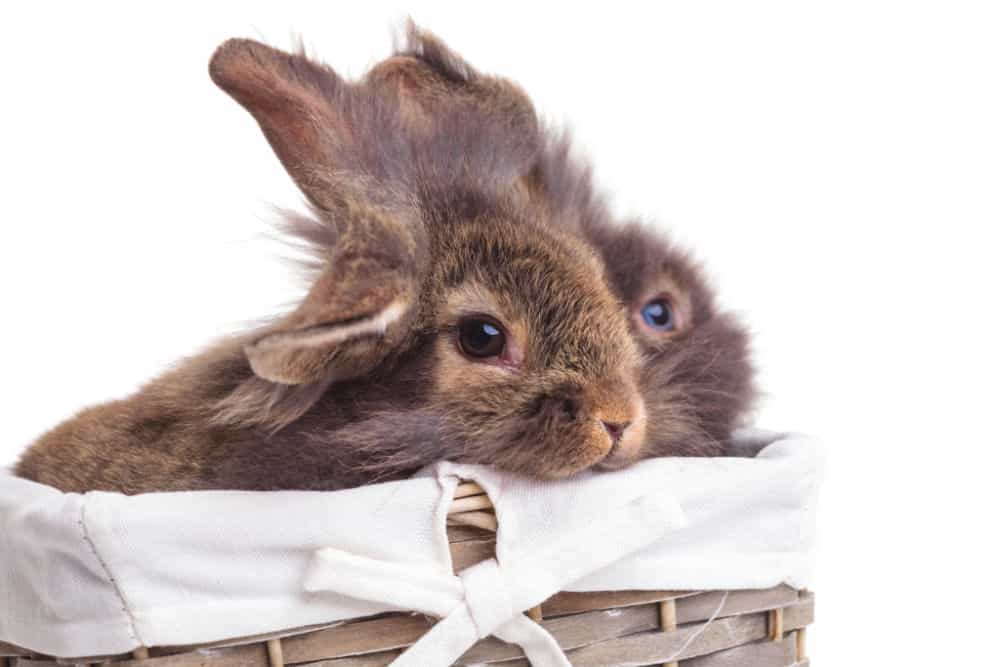
Lionhead Rabbit Baby Care
There are several steps you need to take in the event your Lionhead rabbit doe has babies or kits. These steps are relatively simple, but you will need to follow them correctly.
Separating the Parents
Rabbits are “induced ovulators,” which means giving birth induces ovulation, almost guaranteeing back-to-back pregnancies. However, this isn’t good for your newborn kits, as rabbit gestation only takes about a month. For that reason, your doe will give birth to a new litter before her current litter is completely weaned.
Creating a Safe Space
You will need to provide your mother rabbit and babies a safe place where they won’t be disturbed. Commercial nesting boxes are available for purchase like the Precision Nesting Box by Petmate. Additionally, a covered litter box designed for cats works excellent too.
The goal is to have something high enough that it prevents the kits from escaping. Additionally, you will want to line the nest with a layer of hay or commercial nesting material like Carefresh Small Pet Bedding, which features 10-day odor control.
Adequate Food for Mom
Make sure your mother rabbit has unlimited access to rabbit pellets, orchard grass hay, and leafy green veggies. Likewise, make sure she has a continuous supply of fresh, clean water.
Weaning Your Kits
Your Lionhead kits will begin nibbling solid food at about two weeks of age and start weaning at about four or five weeks. However, you should not entirely wean them until they are at least eight weeks old. Kits weaned any sooner are at a high risk of getting enteritis (intestinal lining inflammation), which can cause fatal diarrhea.
Separation
After eight weeks, it is safe to separate the babies from their mother and send them off with their new adoptive parents.
Lionhead Rabbits and Other Health Concerns
There are a host of pests, illnesses, and other health concerns you should familiarize yourself with regarding your Lionhead rabbit.
Your Lionhead Rabbit and Fleas
Your Lionhead rabbit typically gets fleas from dogs, cats, and other rabbits. Fleas bite, causing considerable discomfort to rabbits and humans if you manage to catch them. Additionally, they can provoke an allergic reaction in some rabbits. Using an appropriate flea medication or shampoo is usually all it takes to get rid of them.
However, in extreme cases, you might need to consult your veterinarian. Likewise, if you suspect your rabbit is experiencing an allergic reaction, you should immediately contact your vet.
Intestinal Worms and Lionhead Rabbits
Lionhead rabbits, like domesticated dogs and cats, can get intestinal worms. Severe cases can lead to weight loss, anemia, kidney damage, blindness, paralysis, and in extreme cases, even death.
Aside from unexplained weight loss, Lionhead rabbits typically don’t show any signs of having intestinal parasites. For that reason, you should include regular checkups with your veterinarian to include stool sample testing.
Lionhead Rabbits and Lice
Rabbits usually experience problems with lice when their surroundings aren’t kept clean. Additionally, if they aren’t properly washed and groomed, lice can appear. Typical symptoms include itching and hair loss.
However, extreme cases can lead to skin ulcerations. Good grooming practices and the use of medication, powders, and lice combs typically eliminate these pests. However, if your rabbit shows any signs of skin lesions or ulcers, contact your veterinarian immediately.
Flystrike and Lionhead Rabbits
This condition happens when your rabbit has fecal matter or urine lingering its hindquarters. The resulting damp environment attracts flies which lay eggs. Then, those eggs hatch and become larvae and will burrow into your Lionhead rabbit’s skin.
Regular grooming and making sure your rabbit remains dry at all times can prevent flystrike from happening. However, if your rabbit exhibits any signs of flystrike, contact your vet as soon as possible.
Lionhead Rabbit Temperament
Lionhead rabbits are friendly and well-mannered animals and tolerant of small children. They are demanding and like spending lots of time with people.
Additionally, they are agreeable and easy to train. For that reason, Lionhead rabbits are great pets for children and adults alike. However, you should teach your children to be gentle when handling them, and younger children may require monitoring when interacting with your Lionhead rabbit.
Although Lionhead rabbits are good-natured and usually aren’t aggressive, it can happen on occasion, particularly if they are startled. If they keep exhibiting aggressive behavior, you may need to modify your interaction with them until the behavior halts.
For example, you may need to give them more attention to satisfy their needs. Or, you may need to provide them with less attention to provide them with more space.
Lionheads cannot use words to tell you what is going in their minds or with their bodies. For that reason, you must familiarize yourself with some common behaviors.
Understanding Your Lionhead Rabbit’s Behavior
- Lionhead rabbits are timid animals that are easily frightened. For that reason, avoid any sudden movements and smiles with bared teeth.
- Male Lionheads tend to be more adventurous than females and are more likely to stray than females. You should supervise males first to make sure they don’t get into any trouble of figuring out a way to escape.
- Nervous rabbits tend to chew on things. Avoid placing your rabbit’s enclosure in a busy or noisy part of the house to avoid unwanted damage to furniture and other household items.
- If your bunny is prone to hiding and squirms when being held, it is likely stressed. Avoid any sudden moves and take your time and let your rabbit get comfortable with you at its own pace.
- Lionheads require a gentle touch. Pay attention to any signs they don’t like being petted or held in a certain way. Likewise, never pick them up by their ears or tails or grab the skin behind their necks.
- If your ordinarily friendly rabbit starts hiding from you for extended periods, that might be a sign it has constipation or is ill. Contact your vet immediately if your rabbit hides out for very long or shows any symptoms of illness or diarrhea.
- Lionheads are affectionate creatures and will lightly nip at you as a sign of affection. If this happens, smile and enjoy the moment.
Additional Sources for Info About Lionhead Rabbits
- American Rabbit Breeders Association Breeders (ARBA) List: Rabbit breeders can pay for inclusion in the ARBA Breeder List. However, be aware that the ARBA does not provide any warranty or guarantee regarding the information listed.
- House Rabbit Society: Founded in 1988, the House Rabbit Society is an international non-profit rabbit rescue and education organization. Their site includes extensive information regarding the care of rabbits and a comprehensive list of adoption resources listed by state.
- Humane Society of the United States: Rabbits: A well-known animal advocacy and educational organization, the Humane Society provides a variety of articles resources for rabbit owners and others interested in learning about them.
- LionheadRabbit.com: This website provides comprehensive and well-sourced information regarding the history of lionhead rabbits, their care, feeding habits, health concerns, and many more.
Enjoying Your Lionhead Rabbit
Adopting a Lionhead rabbit can be the adventure of a lifetime. However, caring for a Lionhead rabbit is not the same thing as picking out a cat or a dog at the local shelter.
There is a learning curve for most people bringing their first rabbit home. Additionally, rabbits are timid creatures requiring a lot of patience.
If you are thinking about bringing a Lionhead rabbit into your home, or if you already have one, you might consider bookmarking this article for future reference.

